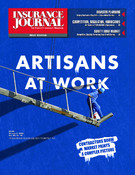The circumstances surrounding Hurricane Katrina are unprecedented in many ways, reports Fitch Ratings. So much so that the rating agency may need to reassess the core risk profile of the property/casualty insurance industry.
The rating agency says it is too soon to anticipate how circumstances will play out, and thus continues to maintain a Stable Ratings Outlook on the U.S. Property/Casualty industry. However, the possibility of a change in Outlook to Negative is real at some point.
Risks related to Hurricane Katrina that will drive Fitch’s future outlook on the U.S. property/casualty industry include: an updated view on the reliability of catastrophe modeling to support risk-adjusted capital adequacy analysis of insurers; resolution of flood-related losses; the ultimate size of insured losses retained by insurers, and the degree to which insurers exhaust their catastrophe reinsurance protections; and the risk of a pricing squeeze on insurers should reinsurers raise rates for reinsurance to a materially greater degree than primary companies are able to raise rates on their insurance policies.
Fitch said it is increasingly concerned that there are many sources of loss in the event of a major catastrophe that fall outside of the scope of, or are not fully captured by, current catastrophe modeling analysis. These sources can include flood, long-term business interruption, looting and fires, as well as ancillary losses on general liability, directors and officers or errors and omissions policies.
As a result, the catastrophe models may not be providing a complete, prospective view of the true underlying risk of loss facing insurers for large or unusual events. The industry’s recent history, including the massive scope of damage caused by Hurricane Katrina, 2004’s high-frequency hurricane season and the events of Sept. 11, highlight the industry’s exposure to unforeseen, and under-modeled, events and conditions, according to Fitch.
Should Fitch conclude that there is a need to assume that a higher degree of uncertainty exists surrounding the reliability of modeled catastrophe loss assessments, such uncertainty would represent a heightened risk exposure that could put downward pressure on insurer ratings.
Fitch believes the attempts of the Mississippi Attorney General to effectively void flood exclusions included in most property insurance policies highlights the ‘deep pocket’ risk borne by the insurance industry. A loss by the industry, or significant compromise on the part of the industry that results in the payment of significant flood-related losses, would heighten our view of the industry’s ‘deep pocket’ exposures. If basic policy exclusions, or other loss mitigation efforts in its risk assessments of an insurer’s financial profile, were not sustained that too would put downward pressure on insurer ratings.
Fitch noted however it is highly likely reinsurers would dispute payment of any flood-related claims.
Fitch said insurers may also start to run the risk of exhausting the coverage on their reinsurance contracts. Should this be the case, any further upward revisions in loss estimates could result in incremental losses that are largely born by primary insurers. This would highlight the possibility that the insurance industry may be ‘under-reinsured’ for large or unusual loss events, especially as losses prove to be larger than expected given the so-called return period of the event.
Hurricane Katrina may ultimately be assessed as a 50-80-year return period event, yet most insurers purchase catastrophe cover to protect against losses for modeled 100-250-year return period events. This possible risk exposure of potentially being under-reinsured relative to expectations, together with the costs of buying additional reinsurance coverage to mitigate this risk, could put downward pressure on ratings.
While losses from Hurricane Katrina will likely result in increases in insurance pricing, reinsurers will be able to raise pricing at a faster pace, and to a greater degree, than primary companies.
Currently Fitch’s best estimate is that the degree of pricing increases post Hurricane Katrina will be lower than those experienced after 9/11, in which a significant ‘hard market’ for insurance pricing emerged across many lines of business. Insurers will likely experience an unprecedented level of commercial property claims from business interruption exposures, and insufficient business interruption coverage, could, in turn, lead to D&O or E&O claims.
Was this article valuable?
Here are more articles you may enjoy.


 Georgia Insurance Law Is About to Get an Upgrade With Multiple Changes
Georgia Insurance Law Is About to Get an Upgrade With Multiple Changes  Commercial P/C Market Softest Since 2017, Says CIAB
Commercial P/C Market Softest Since 2017, Says CIAB  Premium Slowdown, Inflation Factors to Lead to Higher P/C Combined Ratio: AM Best
Premium Slowdown, Inflation Factors to Lead to Higher P/C Combined Ratio: AM Best  Marsh Awarded Injunction Against Former Employees Now With Howden US
Marsh Awarded Injunction Against Former Employees Now With Howden US 


